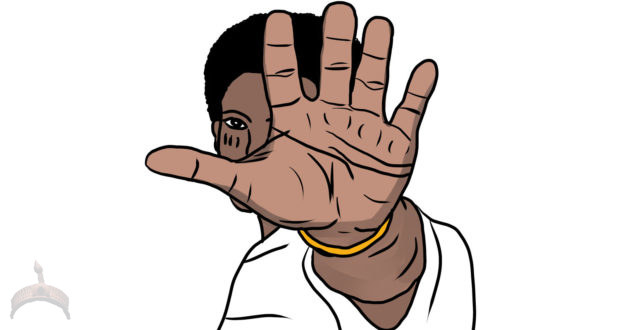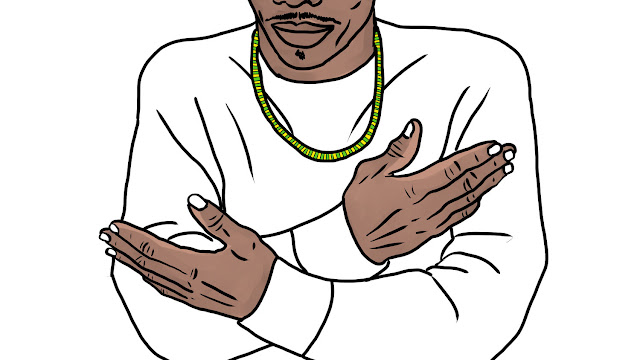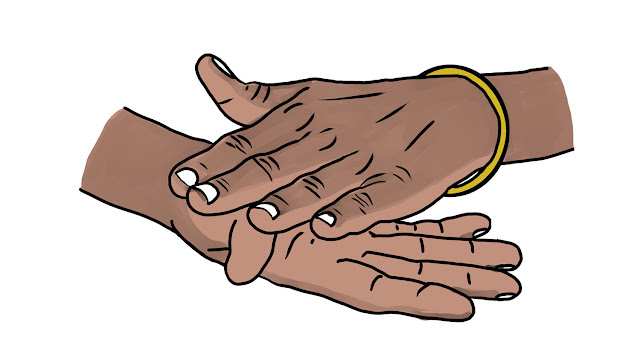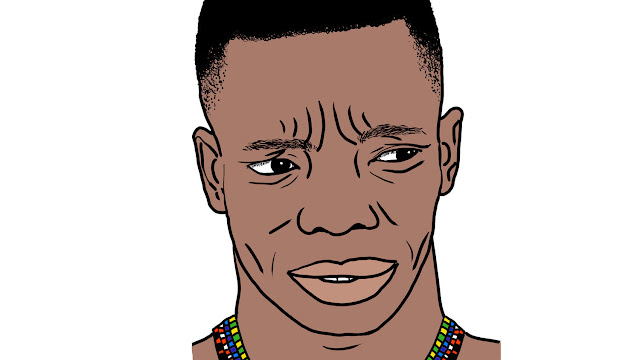FÍ MI’LẸ̀! (LEAVE ME OUT OF THIS!)
First, the upper arms are crossed in front of the chest, and then quickly stretched downwards and parted again to both sides. With this gesture, an idea, a plan or an advice becomes symbolically blocked by the crossed arms and then pushed away with force. It is used to determine very strongly a complete rejection of a proposal or a future activity and to express that a certain plan never will work out. This gesture says: no way!
FÍ ÀTẸ́LẸWỌ́ BÁ Ẹ̀ṢẸ́ (THE PALM OF ONE HAND TO THE FIST OF THE OTHER)
This gesture accompanies usually verbal expressions related to a bodily movement done in repetition, it is used mostly with terms like beating, hitting, whipping, knocking or in a vulgar talking about sexual intercourse. The palm of one open hand is hit against the upper part of the other hand formed into a fist (where the thumb is). This gesture is repeated a few times, its duration is directly related to the story being told and the level of intensity of the described situation.
A similar gesture is used in rituals to call upon ancestors and entities such as deities or those associated with leaves. Here it is performed in a single movement, not repeatedly without a break in between. An Olórìsà would touch e.g. the ground with the tip of his fingers and then clap the same hand, held flat, against the fist of the other hand, while saying e.g. “Ilẹ̀ mo pe o! Dá mi l’óhún!” (Earth I call upon you! Answer me!). This is usually also repeated several times, but each single clapping has more emphasis than in profane speech and is “more ritual performance art than a gesture of daily communication” (Victor Manfredi).
PÀTẸ́WỌ́ (CLAPPING THE HANDS)
The hands are clapped together in this gesture at least three times. One hand is held above the other, and for each clap they exchange their position. Alternately the left hand or the right hand is on top of each other. This is used to express a certain kind of astonishment or surprise caused by impudence. An example: A Yorùbá student is present when his teacher explains grammar to another person. The student, though obviously not able to pronounce Yorùbá, dares to correct his teacher, who then might say: “Bí ọmọdé bá l’áṣo bí àgbà kò lè ní àkísà bí àgbà.”, literally “If a child has clothes like an elder, the child does not have the rags like the elder”. This means not to overrate oneself, if one lacks experience and knowledge. In this situation the teacher claps his hands several times to express that he is criticizing this bold behavior of his student.
PÒṢÉ (SUCKING TEETH)
“Òṣé” is translated in Abraham’s dictionary as a “sigh denoting unhappiness”. This sound is made by the tip of the tongue on the palatine, slightly behind the teeth, when air gets sucked inward “through the teeth”. It can be combined with other gestures, like the ridicule gesture, and can express different feelings, most likely a state of disbelieve, anger, annoyance, impatience or being upset. There’s no illustration here, as there’s nothing to see, just to hear.
OJÚ ÒÓTỌ́ (FACE OF EARNESTNESS)
Following the arguments of Augustine Agwuele, “òtítọ́” (truth, truthfulness) is something considered “korò” (bitter) and this facial expression is the one most misunderstood between òyìnbó and Yorùbá. Try it out yourself – just make an angry and annoyed face. This is the expression used by Yorùbá people when they want to look earnest, sincere, and stress out that they are currently telling the truth! I have seen this very often, but never was aware of it until I read about it. To me as a European it is strange to combine this facial expression with the situation of telling the truth to somebody, or looking honest and angry at the same time. One could add Yorùbá sentences like “Mo n sọ òtítọ́ fún ẹ!” or a bit more emphasized “Òtítọ́ ní mo n sọ fún ẹ!” (I am telling you the truth!) or “Gbà mi gbọ́!” (Believe me!). Many proverbs tell us about the difficult and bitter situation the truth is facing in the world. “Òtítọ́ dọ́jà ó kùtà; owó lọ́wọ́ là ńra èké“, “Truth arrives at the market but finds no buyer; it is with ready cash, though, that people buy falsehood”. People appreciate falsehood more than truthfulness. The bitter face is the truthful face, being honest does not help you a lot in making friends.
I am a Yorùbá student and I am sure there are some spelling mistakes here and there, sorry for that. Mo n try ò. Who wants to support the work of this blog can do this by getting a Yorùbá T-Shirt – follow this link. Thank you.
 Ọmọ Oòduà Naija Gist | News From Nigeria | Entertainment gist Nigeria|Networking|News.. Visit for Nigeria breaking news , Nigerian Movies , Naija music , Jobs In Nigeria , Naija News , Nollywood, Gist and more
Ọmọ Oòduà Naija Gist | News From Nigeria | Entertainment gist Nigeria|Networking|News.. Visit for Nigeria breaking news , Nigerian Movies , Naija music , Jobs In Nigeria , Naija News , Nollywood, Gist and more














(Y)